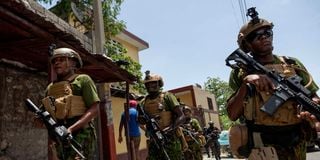Kenyan officers in Haiti upbeat about success of peace mission

Kenyan police and Haitian National Police SWAT units patrol streets in Port-au-Prince, Haiti on June 28, 2024.
What you need to know:
- Kenyan officers are expected to provide operational support to their Haitian counterparts.
- The operations are aimed at combating gangs and improving security in Haiti.
Kenyan police officers who are on a peacekeeping mission in Haiti, alongside their local hosts, say they are confident they will succeed in restoring peace in the Caribbean nation.
Speaking during a joint press conference in Port-au-Prince, the capital of Haiti, Mr Godfrey Otunge, who heads the Multinational Security Support (MSS) mission in Haiti, and Mr Rameau Normil, the director-general of the Haitian National Police (HNP), said they were out to ensure that the gangs that have been wreaking havoc there were rooted out.
Mr Otunge said he was very happy with the warm welcome accorded to the Kenyans by locals and the Haitian government ever since their arrival on June 25.
"Kenya, as the lead country for the MSS mission in Haiti, is happy with the reception and trust we have received from the local people and the support we have received from various organisations, both local and international, as we have begun to engage, collaborate and operate to fulfil our mandate under United Nations Security Council Resolution No. 2699, 2023," said Mr Otunge.
He added that the Kenyan officers will ensure that peace is restored in Haiti by working closely with the Prime Minister Garry Conille-led Haitian government as well as local and international partners.
“There is no room for failure on our part,” Mr Otunge declared. He outlined to mandate of the foreign force as including supporting the efforts of the Haitian National Police to restore security and create conditions conducive to the holding of free and fair elections.
The Kenyan officers are expected to provide operational support to their Haitian counterparts, including capacity building through the planning and conduct of joint security support operations.
The operations are aimed at combating gangs and improving security in Haiti, which has for years been plagued by kidnappings, sexual and gender-based violence, human trafficking and smuggling of weapons, homicides, extrajudicial killings and recruitment of children by armed groups and criminal networks.
Mr Otunge said the Kenyan team would also provide security for critical infrastructure and transit sites, including airports, ports, schools, hospitals and key crossroads.
On his part, Mr Normil said Haitian police had held a series of meetings with their Kenyan counterparts to develop appropriate responses to security issues.

Armoured vehicles patrol Port-au-Prince following the arrival of the first contingent of Kenyan police officers in Haiti on June 29, 2024.
“For strategic reasons, we cannot go into detail about these responses. Over the past 15 days, many people have questioned our work. To answer these questions, we are planning a period of evaluation and planning," he said.
The police chief said the main objective was to neutralise criminal gangs and improve the safety of citizens. He said he had noticed that some areas had been without police officers for years due to attacks by criminal gangs and he had begun to address the issues that would see officers return to their work stations.
For instance, he said, the police had managed to recapture the Gressier Police Station and security officers had taken control of several areas, including the general hospital, to prevent bandits from reorganising.
He further revealed the development of new strategies to track down criminals and enhance citizen security with the help of the Kenyan officers and local authorities.
"The community must understand that the period of leniency is over and we are actively working to restore security," he said. "With the support of the MSS and the entire HNP, we are regaining lost territory and ensuring that security is a national priority.”
Apart from Kenya, other countries that have pledged to send officers to Haiti include Benin, Jamaica, the Bahamas, Belize, Barbados, Antigua and Barbuda, Bangladesh, Algeria, Canada, France, Germany, Trinidad and Tobago, Turkey, the United Kingdom and Spain.
Before the Kenyan officers left for Haiti, renowned gang leader Jimmy Cherizier, alias Barbecue had warned that his gangs would fight them but has since their arrival held two press conferences calling for talks with the government. But Mr Conille has insisted that the gangs lay down their arms first.





